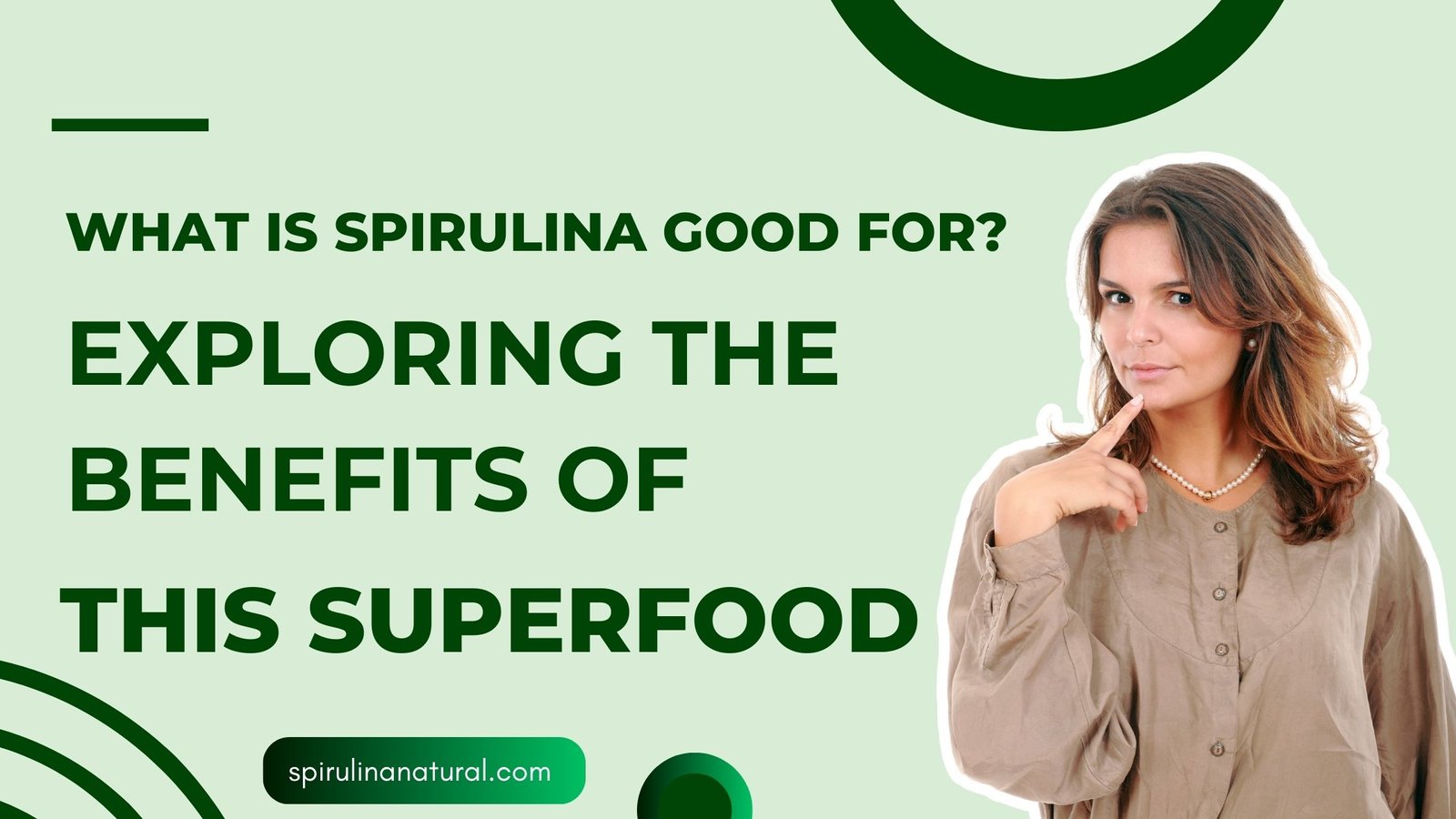Spirulina is a type of blue-green algae that has become popular as a dietary supplement due to its exceptional nutritional content. This microalgae plant has been used for thousands of years by various cultures to promote health and well-being. In recent decades, scientific research has revealed the many health benefits of spirulina, making it one of the world’s most in-demand superfoods.
Nutritional Content of Spirulina
Spirulina is known to have a very rich nutrient profile. Here are several essential nutrients present in spirulina :
1. Protein
Spirulina contains about 60-70% protein by dry weight, making it an excellent source of protein. Spirulina’s protein is considered a complete protein, as it includes all the essential amino acids required by the human body.
2. Vitamins
Spirulina is a rich source of various vitamins, including vitamins A, C, E, and B complex. Vitamin A in the form of beta-carotene is particularly high in spirulina, which is beneficial for eye health and the immune system. Vitamin B12, which is often difficult to obtain from plant sources, is also present in spirulina
3. Minerals
Spirulina contains various essential minerals such as calcium, iron, magnesium, and potassium. The iron in spirulina is highly absorbable by the body, making it a good supplement to prevent anaemia.
4. Essential Fatty Acids
Spirulina contains omega-3 and omega-6 fatty acids, which are important for brain function and heart health. One of the main fatty acids in spirulina is gamma-linolenic acid (GLA), which has anti-inflammatory properties
5. Antioxidants
Spirulina is rich in antioxidants, especially phycocyanin, which gives spirulina its blue-green colour. These antioxidants help fight free radicals in the body, reduce oxidative stress, and protect cells from damage
Spirulina in Scientific Research
Scientific research continues to highlight the various benefits of spirulina, cementing its reputation as a highly useful superfood. Here are some of the latest findings in research regarding spirulina
1. Anti-Cancer

Laboratory research has shown that spirulina can have anti-cancer effects. Components in spirulina, such as phycocyanin, have been found to have anti-tumour properties. A study found that spirulina can reduce tumour size and stop the spread of cancer cells in experimental animals. Although further research in humans is needed, these preliminary results are very promising.
2. Improves Brain Function

Spirulina may help improve cognitive function and protect the brain from degeneration. Antioxidants in spirulina, such as phycocyanin and beta-carotene, help protect the brain from oxidative stress and inflammation, both of which can lead to neurodegenerative diseases such as Alzheimer’s and Parkinson’s. An animal study showed that spirulina can improve memory and learning
3. Reduces Allergy Symptoms
Spirulina may help reduce allergy symptoms such as allergic rhinitis. A study found that spirulina can reduce inflammation and improve the quality of life of people with allergic rhinitis. The anti-inflammatory effects of spirulina help reduce symptoms such as nasal congestion, sneezing, and itching
Nutritional Impact of Spirulina on Body Health
With its incredible spirulina nutrition, spirulina has various positive impacts on the body’s health. Here are some of the key benefits of spirulina consumption :
1. Boosts Immune System

The nutrients in spirulina, especially vitamin C, beta-carotene, and phycocyanin, can boost immune system function. Spirulina helps the body produce more antibodies and increases the activity of immune cells, which can help fight infections and diseases.
2. Increases Energy and Stamina

The protein and vitamin B complex in spirulina help boost energy and reduce fatigue. Spirulina nutrition also helps boost metabolism, which can improve stamina and physical performance.
3. Supports Heart Health

The omega-3 and omega-6 fatty acids in spirulina help reduce inflammation and lower bad cholesterol (LDL) levels in the blood. This can reduce the likelihood of heart disease and stroke. Spirulina nutrition may also help lower high blood pressure.
4. Improves Eye Health

The beta-carotene and vitamin A in spirulina are excellent for eye health. They can aid in preventing macular degeneration, cataracts, and other age-related eye issues.
5. Blood Sugar Control

Research shows that spirulina can help control blood sugar levels. This is especially beneficial for people with type 2 diabetes, as spirulina can help improve insulin sensitivity and lower fasting blood sugar levels
6. Helps with Weight Loss
Spirulina nutrition can help suppress appetite and increase satiety, which can help in weight loss programmes. The protein in spirulina also helps boost metabolism, which helps the body burn more calories.
7. Detoxifies the Body

Spirulina has the ability to bind to heavy metals and other toxins in the body, helping to remove them through the detoxification process. This is especially beneficial for people exposed to pollution or other toxic substances.
8. Improves Skin and Hair Health

The antioxidants and vitamins in spirulina can help repair and protect the skin from free radical damage. Spirulina also helps increase collagen production, which is essential for elastic and healthy skin. The nutrients in spirulina are also beneficial for hair health, helping to prevent loss and promote hair growth.
How to Consume Spirulina
Spirulina can be ingested in multiple forms, such as powder, tablets, capsules, and as an ingredient in foods and beverages. Here are some methods to consume spirulina :
1. Add to Smoothies
One of the most popular ways to consume spirulina is by adding it to smoothies. You can mix a teaspoon of spirulina powder into your favourite fruit smoothie.
2. Mix into Juice
Spirulina can also be added to vegetable or fruit juices. Its strong flavour may require a little adjustment, but the health benefits are well worth it.
3. Consume in Tablet or Capsule Form
If you don’t like the taste of spirulina, you can consume it in tablet or capsule form. This is an easy and practical way to get the benefits of spirulina without having to mix it with food or drinks.
4. Add to Food
Spirulina powder can be added to various foods such as soups, salads, or even baked in breads and cakes. This is a creative way to increase the nutrient content in your diet.
Read also : Benefits of Spirulina for Women
Conclusion
Spirulina is one of the most impressive superfoods with an incredible range of spirulina nutrition . The proteins, vitamins, minerals, essential fatty acids, and antioxidants in spirulina provide a wide range of health benefits, including boosting the immune system, increasing energy and stamina, supporting heart health, improving eye health, controlling blood sugar, aiding weight loss, detoxifying the body, and improving skin and hair health.
With a variety of flexible ways of consumption, spirulina can be easily incorporated into everyday diets. Despite its distinctive flavour, the health benefits offered by spirulina make it a valuable addition to a healthy lifestyle. Always consult a healthcare professional before starting any new supplement, especially if you have pre-existing health conditions or are taking certain medications.








2 Responses
Really superb info can be found on web site.Blog money